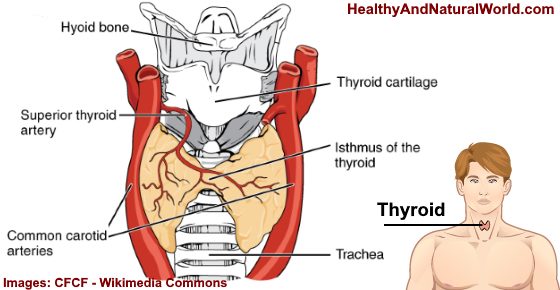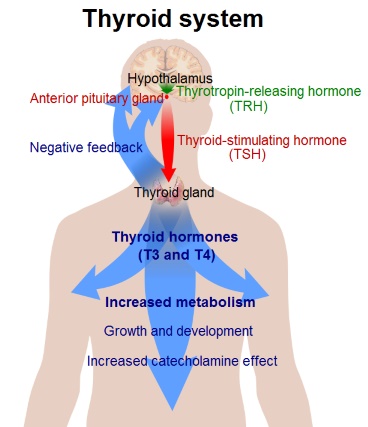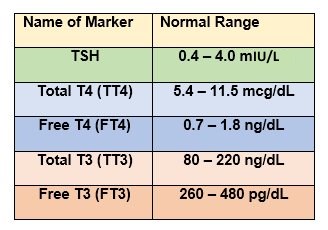TSH Levels: Normal, High, or Low (Including Optimal Thyroid Levels)

TSH is a hormone secreted by the brain’s pituitary gland to control the activity of your thyroid gland. TSH stands for thyroid stimulating hormone and as its name suggests, it stimulates the thyroid to produce thyroid hormones. Levels of TSH affect the production the hormones triiodothyronine (T3) and thyroxine (T4). Doctors usually test TSH level to see if it’s within the normal range if you show symptoms of an overactive or underactive thyroid.
You may also have to regularly go for a TSH blood test or T4 blood test if you are receiving hormone treatment for a thyroid condition.
Optimal TSH levels are critical for your body’s function, including your general health and wellbeing. Thyroid hormones help control your metabolic rate, heart function, nervous system, and digestion. Although TSH isn’t classed as a thyroid hormone, high or low TSH levels can disrupt levels of T3 and T4. This can result in symptoms of hyperthyroidism or hypothyroidism.
In this article, you will find out all you need to know about TSH and how it affects your thyroid hormone levels. You will also learn about thyroid-related symptoms if TSH levels are higher or lower than the normal range.
What Does the Thyroid Do?
Your thyroid gland is a small butterfly-shaped organ that sits in the front part of your neck just above the middle of your collarbone. PubMed Health says that your thyroid continually secretes hormones into your bloodstream. Usually, more thyroid hormones are produced when the body needs more energy, like when it is growing or during pregnancy.1
What is TSH (Thyroid-Stimulating Hormone)?
The hypothalamus, in the base of the brain, releases TRH (thyrotropin-releasing hormone) to stimulate the pituitary gland. The pituitary gland then produce TSH to stimulate production of thyroid hormones (T4 and T3) that affect almost every organ in your body.
In optimal conditions, TSH levels ensure that just enough T3 and T4 hormones are released into your bloodstream.
Dr. Neha Pathak on WebMD says that thyroid stimulating hormone (TSH) is produced by the pituitary gland in your brain. The reasons that TSH levels can fluctuate is mainly due to levels of T3 or T4 in your blood.2
High TSH levels can mean that your thyroid is sluggish and underactive because there is not enough T3 or T4 being produced. If you are pregnant, it’s normal for TSH levels to become slightly elevated.2
Low TSH levels can indicate an overactive thyroid condition and can be a result of an autoimmune condition or having too much iodine in your diet.2
The chart below helps you see how TSH controls the thyroid.
Dr. Oliver Starr on Patient.info explains more about what TSH is. Dr. Starr says that the pituitary gland in your brain should produce the right amount of TSH. This, in turn, stimulates the thyroid to produce the right amount of thyroxine (T4) and triiodothyronine (T3).7
The information on the levels of thyroid hormones in your blood is then fed back to your brain. This is called the feedback loop. As T4 and T3 levels in the blood rise, feedback to your brain tells it to produce less TSH. However, if thyroid hormones levels are too low, your pituitary gland will produce more thyroid stimulating hormone to increase thyroid hormone levels.
T3 and T4: What Are They?
Triiodothyronine (T3) and thyroxine (T4) are two thyroid hormones that TSH stimulates.
Doctors say that T4 is the most important of the thyroid hormones and affects almost every function in the human body.3 If doctors suspect hyperthyroidism or hypothyroidism, they usually test T4 levels. T3 is the most powerful thyroid hormone, and as T4 it affects almost every process in the body.4
T3 and T4 hormones usually bind themselves to proteins in the blood where they are delivered to your cells. Some hormone, however, doesn’t attach to protein and this is called free T4 or free T3. Doctors will usually test for free T4 (FT4) to see how much of the hormone is available for your body’s energy requirements.
Related article: What are T3 and T4: The Complete Guide to Your Thyroid Hormones
Normal Range for T3 and T4
If your TSH levels are abnormally high or low, doctors will usually arrange for free T4 or free T3 blood test. These tests can help doctors diagnose if you suffer from hyperthyroidism (overactive thyroid) or hypothyroidism (under active thyroid).
Free T4 (T4) range
Dr. Muhammad Bader Hammami on Medscape says that free T4 (FT4) range is as follows:5
- Children and adolescents: 0.8 – 2 ng/dL (10 – 26 pmol/L)
- Adults: 0.7 – 1.8 ng/dL (9 – 23 pmol/L)
- Pregnant women: 0.5 – 1 ng/dL (6.5 – 13 pmol/L)
Total T4
The total thyroxine (TT4) range is as follows:
- Babies up to 2 weeks old: 11.8 – 22.6 mcg/dL (152-292 nmol/L)
- Infants over 2 weeks old and children: 6.4 – 13.3 mcg/dL (83 – 172 nmol/L)
- Adults: 5.4 – 11.5 mcg/dL (57 – 148 nmol/L)
Free T3 (T3)
According to Dr. Jayita Poduval on Medscape, only adults are usually tested for levels of free T3. Test results are measured in picograms per deciliter. The normal free T3 (FT3) range is as follows:6
- Adults: 260 – 480 pg/dL (4 – 7.4 pmol/L)
Total T3
The normal reference range of triiodothyronine (TT3) is as follows:
- Children: 125 – 250 ng/dL
- Adults: 80 – 220 ng/dL
Normal TSH Levels (Normal Thyroid Levels)
A thyroid function test usually starts with testing if TSH levels are normal and if free T4 levels are within the normal range. According to Dr. Oliver Starr (quoted earlier), normal thyroid levels depend on a few things like your age, if you are pregnant or not, or taking certain medications.7
Dr. Starr recommends testing TSH levels under a doctor’s supervision rather than doing a hypothyroidism test at home.
TSH normal range
According to the U.S. National Library of Medicine the normal TSH range in healthy adults is 0.4 to 4.0 milli-international units per liter (0.4 – 4.0 mIU/L).7
For your thyroid to be working correctly, your lab test results for normal free T4 levels should be 9 – 23 pmol/L (0.7 – 1.8 ng/dL)
However, recent studies into optimal thyroid levels have recommended that the upper normal range for TSH hormone tests should be lowered. According to the Journal of Clinical Endocrinology & Metabolism, an upper limit of 2.5 mIU/L is more appropriate as the currently accepted TSH normal range.8
This is because individuals with TSH in the range of 2.5 – 4.0 mIU/L are considered to be in the risk group for developing thyroid disorders.
However, it is accepted that the normal TSH range increases with age.
Let’s look in more detail at the normal levels of TSH that are age-specific or take into account pregnancy.
TSH levels for premature birth
Babies born prematurely often suffer from thyroid dysfunction, and all babies have their thyroid levels routinely tested. According to microbiologist Dr. Alina G. Sofronescu, the TSH levels for premature birth are:9
- Premature infants: 0.7 – 27.0 mIU/L
TSH levels for children
The Journal of Clinical Endocrinology & Metabolism says that the normal TSH range for children that take into account their age is as follows:
- Infants 1 day old: 1.9 – 17.58 mIU/L
- Infants 1 week old: 0.58 – 5.57 mIU/L
- Children one-year-old: 0.57 – 5.54 mIU/L
- Adolescents 18 years old: 0.51 – 4.93 mIU/L
TSH levels for adults (men and women)
The normal TSH range for adult men and women is as follows:
- Adults aged 21-54: 0.4 – 4.0 mIU/L
Depending on the lab, some doctors give the normal TSH level as 0.4 – 4.2 mIU/L.
TSH levels during pregnancy
Thyroid-stimulating hormone can fluctuate during pregnancy due to the baby’s growth and extra stress on the thyroid.
According to doctors from Medscape, the normal TSH range during the 3 trimesters of pregnancy are as follows:9
- First trimester: 0.3 – 4.5 mIU/L
- Second trimester: 0.5 – 4.6 mIU/L
- Third trimester: 0.8 – 5.2 mIU/L
However, a study published in 2015 recommended that cut off points for TSH levels during pregnancy should be lowered. The journal Clinical Chemistry stated that high TSH levels during the first trimester should be viewed as anything over 2.5 mU/L. During the second and third trimester, the TSH normal range for pregnant women should be 0.2 – 3.0 mU/L.11
TSH Normal Range by Age
In older adults, it is expected that normal levels of TSH increases. The Journal of Clinical Endocrinology & Metabolism published a report specifying age-specific TSH ranges for older adults. These are as follows:15
- Adults aged 51 – 60: 0.51 – 4.36 mU/L
- Adults aged 61 – 70: 0.48 – 4.59 mU/L
- Adults aged 71 – 80: 0.40 – 4.96 mU/L
- Adults over 80: 0.36 – 5.94 mU/L
High TSH Levels
Generally, high TSH levels are an indication of an underactive thyroid or hypothyroidism.
Doctors from the Mayo Clinic say that blood tests for hypothyroidism usually show elevated TSH and low thyroxine (T4) levels. Subsequent blood tests will help to determine the best medication for treating hypothyroidism and the right dosage.12
Dr. Ruchi Mathur who specializes in endocrinology and metabolic disorders says that some people have subclinical hypothyroidism. This is where thyroid function tests show high TSH but normal T4 and T3. Usually, there are no obvious symptoms of subclinical hypothyroidism.13
Symptoms of elevated TSH levels
Your doctor will usually have you take a blood test for hypothyroidism if you are showing symptoms of too little thyroid hormones but high TSH. Dr. Ruchi Mathur says that some symptoms of hypothyroidism include:13
- Increased sensitivity to cold
- Fatigue
- Weight gain and difficulty losing weight
- Dry skin and hair
- Wanting to sleep all the time
- Tenderness and stiffness in your joints and muscles
- Hair loss
- Mood changes like depression
Low TSH Levels
TSH level below 0.4 mU/L is considered low.
Your pituitary gland may not produce enough TSH if your thyroid is secreting more than normal thyroid hormone. Low TSH levels and high T4 and T3 levels usually are a sign of an overactive thyroid (hyperthyroidism).
Some reasons for your thyroid working overtime can include Grave’s disease (antibodies in the blood that stimulate the thyroid), goiter, or toxic adenoma (hot nodule).14
Symptoms of lower than normal TSH levels
Dr. Oliver Starr on Patient.info says that if your pituitary gland is not producing enough TSH because of an overactive thyroid, you may experience any of the following hyperthyroidism symptoms:15
- Restlessness with nervous behavior
- Trouble getting to sleep and disrupted sleep patterns
- Increased sweating, shortness of breath, and faster heartbeat
- Infrequent or light periods
- Diarrhea
- Visibly enlarged thyroid gland in the front of your neck
Thyroid Levels Chart (TSH Levels Chart)
Below is a TSH levels chart so that you can easily see what the normal thyroid levels are. The chart helps to show TSH, T3, and T4 levels and what you should expect to see on your lab test results.
Optimal Thyroid Levels (Optimal TSH Levels)
It can be challenging for doctors to know the optimal thyroid levels for each patient because a number of factors need to be taken into consideration.
For example, as research on treating hypothyroidism has shown, not all doctors agree on what should be classed as “normal” or high TSH levels. The traditional approach to interpreting hypothyroidism test results was to have a cutoff point at around 4.0 or 4.5 mU/L. However, some doctors challenge this and say that the normal TSH level shouldn’t be above 2.5 mU/L.
As Dr. Bernadette Biondi, who published findings on the normal TSH reference range, stated, lowering the range to 0.4 – 2.5 mU/L may end up putting more people on medication for hypothyroidism.8
When aiming to find optimal thyroid levels when treating hypothyroidism, a doctor’s goal is to see improvement in the patient’s symptoms. This could mean that an individual’s optimal thyroid level may need to be closer to the lower end of the TSH “normal” range rather than being in the middle.
There are other factors that should be taken into consideration when determining optimal TSH levels. Let’s look at the effect age, diabetes, and heart conditions are associated with a thyroid disorder.
Age
As we get older, our pituitary gland increase TSH hormone secretion and therefore optimal TSH range for an older may be higher than a younger person.
For example, a study in 2013 into age-related TSH ranges found that the majority of people, males and females, under 40 were well below the newly recommended threshold of 2.5 mU/L. However, after age 40, there is a significant increase in average TSH levels. The researchers concluded: “Our analysis shows that the median and range of TSH increases with age.”8
Diabetes
Diabetes can also increase the amount of thyroid stimulating hormone (TSH) that controls the thyroid gland. Researchers have discovered that generally, people with diabetes have a higher concentration of TSH in blood tests.8
According to the Journal of Diabetes Research, insulin resistance also affects thyroid function. Some studies show that many diabetics have high TSH and low thyroid hormone levels causing hypothyroidism. However, hyperthyroidism is also a risk factor for people with diabetes.17
Heart conditions
Another issue facing doctors when finding the optimal thyroid levels is how thyroid function affects the heart.
The journal Circulation reported that thyroid hormone raises metabolic heart rate and impacts on the heart and blood pressure. For example, widened pulse pressure, hypertension, and pulmonary hypertension are some cardio-related effects of thyroid dysfunction.18
TSH Test – Problems and Issues
One of the problems of just relying on the TSH test to check for signs of thyroid dysfunction is that it doesn’t provide a complete picture of thyroid levels.
First of all, as I’ve already pointed out, there is no consensus of opinion on what counts as high TSH levels. Most doctors stick to the traditional reference range of 4.5 mU/L, however recent studies advise the normal TSH range to be lowered to 2.5 mU/L.
Also, the journal Best Practice & Research, Clinical Endocrinology & Metabolism reported that relying on TSH tests to test thyroid function can lead to misdiagnosis. In worst-case scenarios, doctors may even fail to spot serious thyroid conditions by relying just on TSH levels. This is because sometimes TSH levels may be within the “normal” range but free T4 or free T3 levels may be higher or lower than acceptable levels.19
Many clinics now offer combined screening for TSH levels along with checking levels of thyroxine (T4). So, if you still feel unwell and your TSH levels are not abnormal, ask your doctor to perform tests for free T4 and T3.
Other Tests for Checking the Thyroid Health
There are additional tests that check the health of your thyroid that provide more results than just TSH levels in blood serum.
The National Institute of Diabetes and Digestive and Kidney Diseases says that tests to diagnose reasons for thyroid dysfunction include:20
- TSH testing
- Free T4 for hypothyroidism or hyperthyroidism
- Free T3
- Reverse T3
- Testing thyroid antibodies for Hashimoto’s disease or Grave’s disease
- Ultrasound to examine thyroid nodules
- Radioactive iodine uptake test in cases of hyperthyroidism
Read these related articles:
- How to Test Your Thyroid With a Thermometer
- Top 13 Signs That You May Have a Thyroid Disorder
- 1 Minute At Home Thyroid Cancer Self-Test: This Can Save Your Life
Medical Sources:


